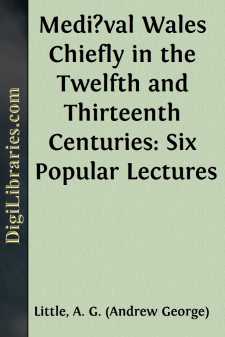Categories
- Antiques & Collectibles 13
- Architecture 36
- Art 48
- Bibles 22
- Biography & Autobiography 813
- Body, Mind & Spirit 142
- Business & Economics 28
- Children's Books 14
- Children's Fiction 11
- Computers 4
- Cooking 94
- Crafts & Hobbies 4
- Drama 346
- Education 46
- Family & Relationships 57
- Fiction 11828
- Games 19
- Gardening 17
- Health & Fitness 34
- History 1377
- House & Home 1
- Humor 147
- Juvenile Fiction 1873
- Juvenile Nonfiction 202
- Language Arts & Disciplines 88
- Law 16
- Literary Collections 686
- Literary Criticism 179
- Mathematics 13
- Medical 41
- Music 40
- Nature 179
- Non-Classifiable 1768
- Performing Arts 7
- Periodicals 1453
- Philosophy 64
- Photography 2
- Poetry 896
- Political Science 203
- Psychology 42
- Reference 154
- Religion 513
- Science 126
- Self-Help 84
- Social Science 81
- Sports & Recreation 34
- Study Aids 3
- Technology & Engineering 59
- Transportation 23
- Travel 463
- True Crime 29
Medi?val Wales Chiefly in the Twelfth and Thirteenth Centuries: Six Popular Lectures
Description:
Excerpt
INTRODUCTORY
IN the following lectures no attempt will be made to give a systematic account of a political development, which is the ordinary theme of history. History is “past politics” in the wide sense of the word. It has to do with the growth and decay of states and institutions, and their relations to each other. The history of Wales in the Middle Ages, viewed from the political standpoint, is a failure; its interest is negative; and in this introductory lecture I intend to discuss “the failure of the nation” (to use the words of Professor Rhys and Mr. Brynmor Jones) “to effect any stable and lasting political combination.” Wales failed to produce or develope political institutions of an enduring character—failed to become a state. Its history does not possess the unity nor the kind of interest which the history of England possesses, and which makes the study of English history so peculiarly instructive to the student of politics. In English history we study primarily the growth of the principle of Representative Government, which we can trace for centuries through a long series of authoritative records. That is the great gift of England to the world. Not only has Wales entered on this inheritance; it helped to create it. It was Llywelyn ap Iorwerth who began the revolt against John which led to the Great Charter, and the clauses of the Great Charter itself show that it was the joint work of English and Welsh. Wales again exerted a decisive influence on the Barons’ War—the troubles in which the House of Commons first emerged. And Wales—half of it for more than six hundred years—half of it for nearly four hundred—has lived under the public law and administrative system which the Norman and Angevin kings of England built up on Anglo-Saxon foundations. This public law and this administrative system have become part and parcel of the life and history of Wales. The constitutional history of England is one of the elements which go to make up the complex history of Wales.
The history of Wales, taken by itself, is constitutionally weak; and its interest is social or personal, archæological, artistic, literary—anything but political. And the fact—which is indisputable—that Wales failed to establish any permanent or united political system needs explanation.
The ultimate explanation will perhaps be found in the geography of the country. The mountains have done much to preserve the independence and the language of Wales, but they have kept her people disunited; and the Welsh needed a long drilling under institutions, which could only grow up in a land less divided by nature, before they could develope their political genius.
Wales, owing largely to its geography, had the misfortune never to be conquered at one fell swoop by an alien race of conquerors. Such a conquest may not at first sight strike one as a blessing, but it is, if it takes place when a people is in an early, fluid, and impressionable stage, as may be seen from a comparison of countries which have undergone it with countries which have not—a comparison, for instance, of England with Ireland or Germany....


